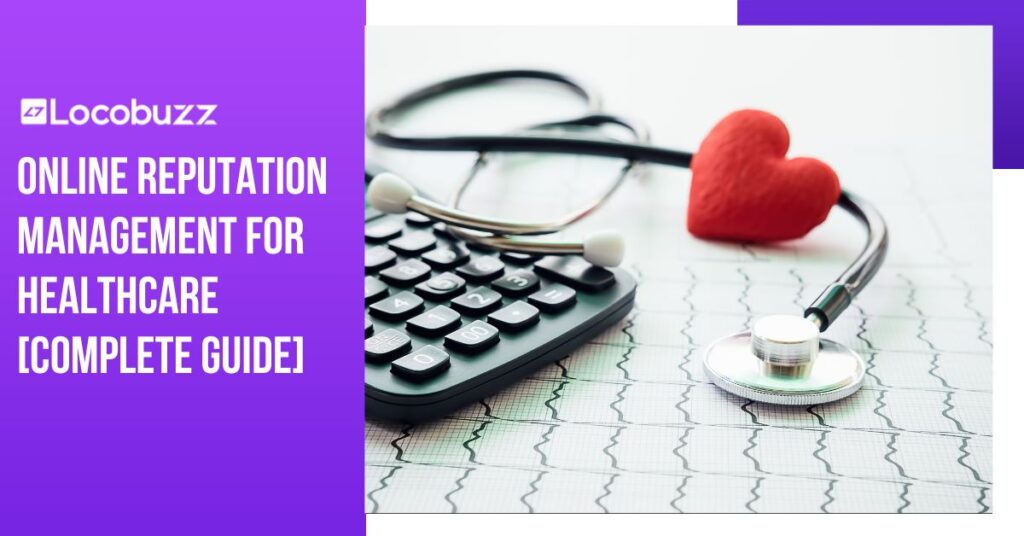Online Reputation Management for Healthcare [Complete Guide]

Have you ever searched for a new doctor and scrolled through pages of online reviews before making an appointment? Nowadays, online reviews hold immense power to influence a customer’s decision. Just like positive reviews can fill a doctor’s waiting room, negative ones left unchecked can spread worry and deter patients. This is where online reputation management (ORM) for healthcare comes in!
It’s your guide to navigating the online world of customer reviews, building trust, and attracting new ones. It’s about showcasing the excellent care you provide and ensuring your online presence reflects the positive experiences your customers have. People are searching for doctors and hospitals online more than ever, and the reviews they find can make a huge difference.
Online reputation management for healthcare helps them maintain a positive image and build customer trust. A strong online reputation can directly impact a healthcare provider’s ability to attract and retain customers. It’s not just about handling reviews; it’s about making a good online impression and showing how caring and trustworthy the healthcare organization is.
What is Online Reputation Management for Healthcare?
Online reputation management for healthcare is like taking care of your online image with your customers. It’s about making sure people find positive information about your practice when they search for you online.
There are two main ways to do this. First, take charge! Make your website easy to use with clear information about doctors, services, and how to schedule appointments. Happy customers are the best source of good reviews, so politely ask them to share their experiences on sites. When someone leaves a review, take the time to respond, thanking them for positive feedback and addressing any concerns they raise. Social media is another great tool. Use platforms like Facebook to connect with patients, share educational content, and show your commitment to the community.
Second, be prepared to handle any negative reviews that might pop up. Respond quickly and apologize for any mistakes. If a customer had a specific issue, explain what you would do differently next time. Always be professional and respectful, even if the review is harsh.
By taking charge and addressing concerns, you can build a strong online reputation that reflects the quality of care you provide. This will help you attract new customers and keep the ones you already have. Online reputation management will maintain your positive image and help you succeed in achieving your long-term goal!
Importance of ORM in Healthcare
Online reputation management (ORM) is important for healthcare providers to uphold a positive image online. It influences how customers perceive and trust your practice or facility. When you handle your online reputation well in healthcare, it builds trust, improves your brand reputation, attracts and retains customers, increases your visibility in online searches, and helps deal with problems better.
1) Trust and Credibility
When doctors and hospitals have good reviews online, people trust them more. When people search for healthcare providers or facilities online, positive reviews and feedback can reassure them that they are choosing a reputable and reliable source for their medical needs. It’s like when you ask your friends for advice on where to go – if many people say something is good, you will probably believe them.
2) Customer Satisfaction
Doctors and hospitals can make customers happier by listening to their feedback online. If someone says something, and the doctor or hospital responds nicely, it shows they care about customers and are responsive. This can make them feel more satisfied with the care they receive.
3) Building a Good Image
Maintaining a positive online reputation contributes to shaping a healthcare provider’s brand image. Like how companies have a good or bad reputation, doctors and hospitals do too. A good online reputation helps to build a positive image which leads to more people wanting to go there. However, if there are lots of negative comments online, it can damage the reputation.
Discover how Locobuzz's ORM capabilities are transforming the Healthcare Sector
Role of ORM in Healthcare
Imagine you are looking for a new dentist. In the past, you might have asked friends or family for recommendations. But today, most people turn to the internet. They search for dentists in their area and read online reviews to get a sense of other customer’s experiences. This is where online reputation management (ORM) comes in for healthcare providers.
Think of ORM as taking care of your online image, just like you take care of your physical health. A strong online reputation for a doctor or hospital means having mostly positive reviews and feedback easily found by potential customers. Positive reviews that mention a doctor’s friendliness, helpful staff, and modern facilities create trust and make people more likely to choose that provider.
For example, if a customer sees a review mentioning a doctor who listens carefully and explains things clearly, they are more likely to feel comfortable booking an appointment with that doctor. On the other hand, negative reviews can hurt a healthcare provider’s reputation. Imagine a review complaining about long wait times or rude staff. This could make potential customers look elsewhere. By actively managing their online presence, healthcare providers can build trust with customers and attract new business.
5 Benefits of ORM for Healthcare
Customers turn to online reviews to find trusted healthcare providers in today’s generation. Here’s how online reputation management can improve your practice. From attracting new customers to improving customer care, online reputation management will strengthen your online presence and build trust with the community.
1) Attract new customers
Imagine you are looking for a doctor. You probably wouldn’t pick one without any reviews, right? That’s how many patients choose doctors today. Online reputation management helps you build a strong online presence with positive reviews. This makes your practice appear more trustworthy to new customers searching for healthcare providers. They will see happy customers recommending your services and feel confident choosing you.
2) Improve customer care
Online reviews aren’t just about praise, they can also highlight areas for improvement. By monitoring reviews, you can see what customers are saying about your practice. For instance, if many reviews mention long wait times, you can address this by improving appointment scheduling. This shows customers you care about their experience and encourages them to keep
coming back for future healthcare needs.
3) Collecting feedback for improvement
Think of online reviews as a direct line to your customer’s thoughts. Reputation management helps you listen to this feedback. Maybe customers appreciate a particular doctor or staff which means you can highlight that doctor’s expertise on your website. Or, if reviews mention a confusing billing process, you can simplify it. By using reviews to identify strengths and weaknesses, you can constantly improve your practice and provide the best possible care.
4) Responsive communication
Imagine you leave a positive review for a doctor, and he thanks you publicly. It makes you feel good, right? Responding to reviews shows customers you value their feedback whether it’s positive or negative. When someone leaves a positive review, just thank them and show you are happy they liked your service. If it’s a bad review, say sorry for the problem and explain what you are doing to make things better. Talking like this helps customers trust you more and makes your relationship stronger with them.
5) Increase online visibility
Did you know good online reviews can improve your ranking on search engines like Google? This means when people search for healthcare providers in your area, your practice is more likely to show up first. Reputation management helps you get more positive reviews, which in turn makes your practice more visible online. This translates to more customers finding you and choosing your services.
Building a Positive Online Reputation Strategy
Nowadays, your online reputation is a critical piece of attracting new customers and keeping existing ones happy. By actively managing and cultivating a positive online reputation, healthcare providers can enhance their brand image, foster customer loyalty, and ultimately improve their practices. Here’s how to build a positive online reputation strategy for your healthcare practice.
Step1: Listen to customer feedback
Think of online reviews as a direct line to your customer’s thoughts. Make it a habit to regularly check review sites. Look for patterns in the feedback. If many customers mention friendly staff, highlight that on your website! Conversely, if wait times get mentioned often, address them by improving appointment scheduling or offering entertainment options in the waiting room. This shows customers that you take their feedback seriously and care about their experience.
Step 2: Respond to feedback and make a conversation
Responding to online reviews shows customers you value their feedback, both positive and negative. For happy customers, a simple “thank you” on their review strengthens your connection. For negative reviews, acknowledge their concerns, apologize for any issues, and explain how you are working to improve things. This two-way communication builds trust and shows you are committed to providing the best possible care.
Step 3: Engage with your community online
Use social media platforms like Facebook or Twitter to connect with customers and the community. Respond to comments and questions, participate in relevant discussions, and share local health news or events. This builds a sense of connection and shows you are approachable and invested in your community’s well-being. Share doctor bios with personal touches, highlight customer success stories (with permission, of course!), or post informative videos on common health topics.
Step 4: Being authentic builds trust
Healthcare providers need to be real and trustworthy online. Customers need to know they can believe what they see about your practice on the internet. This means being honest about the services you offer, your qualifications, and anything else important. For example, if your clinic focuses on kids’ health or heart problems, make sure you say that clearly on your website and social media. This way, customers can trust that you know what you are doing and pick your practice with confidence.
Step 5: Encourage happy customers to share:
Don’t be shy about encouraging satisfied customers to leave reviews! Train your staff to politely ask them for feedback after appointments. You can also send follow-up emails with links to popular review sites. Making it easy for happy customers to share their positive experiences will naturally boost your online reputation and attract new customers looking for trusted care. People tend to connect with genuineness. Showcase the human side of your practice!
Building a positive online reputation strategy for healthcare involves proactive monitoring, delivering quality care, maintaining authenticity and trust, and leveraging reputation management techniques. By prioritizing these areas, healthcare practices can establish themselves as trusted providers in the eyes of current and potential customers.
Best tool for ORM in Healthcare
In healthcare, where trust is paramount, managing your online reputation is important. Locobuzz can be a strong ally in this fight.
Firstly, Locobuzz listens everywhere. It gathers mentions of your healthcare facility from social media, review sites, news outlets, and even forums. This way, you won’t miss a beat, whether someone is praising your excellent care or raising a concern.
Locobuzz doesn’t just listen, it understands. It analyzes the conversations, figuring out the overall sentiment, be it positive or negative. This helps you prioritize responses. If someone is singing your praises, you can express gratitude. But if a customer is unhappy, you can address their concerns quickly and professionally.
Locobuzz helps you stay ahead of crises. By keeping a pulse on online conversations, you can spot potential issues early on. This allows you to take action before a small problem snowballs into a bigger reputation crisis.
Finally, the platform goes beyond just reacting. It helps you understand what people are saying about your healthcare facility. This feedback can be invaluable for improving your services and building a stronger reputation.
Locobuzz isn’t a magic bullet, but it equips you with the tools and insights you need to take control of your online reputation and build trust with your patients.
Final Thoughts
Managing your reputation online is super important, especially for healthcare. When people need medical help, they often check reviews and feedback online before choosing a doctor or hospital. It helps people trust the healthcare provider more, feel happier with their care, and see they are reliable. So, healthcare providers must have a good online image to attract and keep patients happy.
To make sure their online reputation stays positive, healthcare providers need to listen to what customers say, respond nicely, be honest, and encourage happy patients to share their experiences. Tools like Locobuzz can be useful for keeping an eye on what people are saying online and dealing with any issues early on.
So, managing your online reputation in healthcare isn’t just about handling reviews. It’s about showing that you give good care and making people feel confident in choosing you for their health needs. By focusing on this, healthcare providers can make sure patients are happy and their business keeps growing in today’s digital world.






















